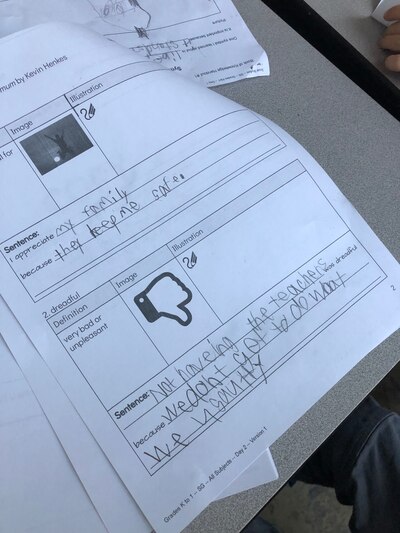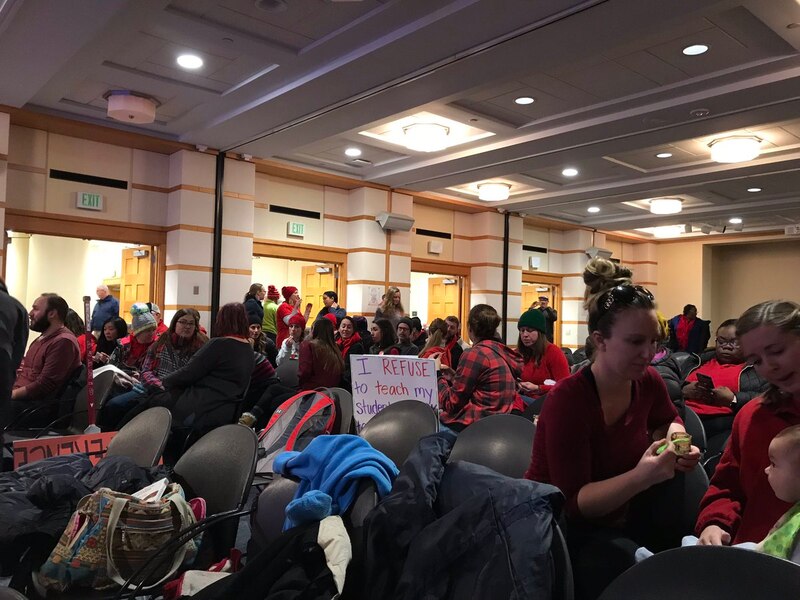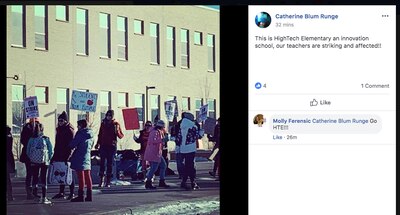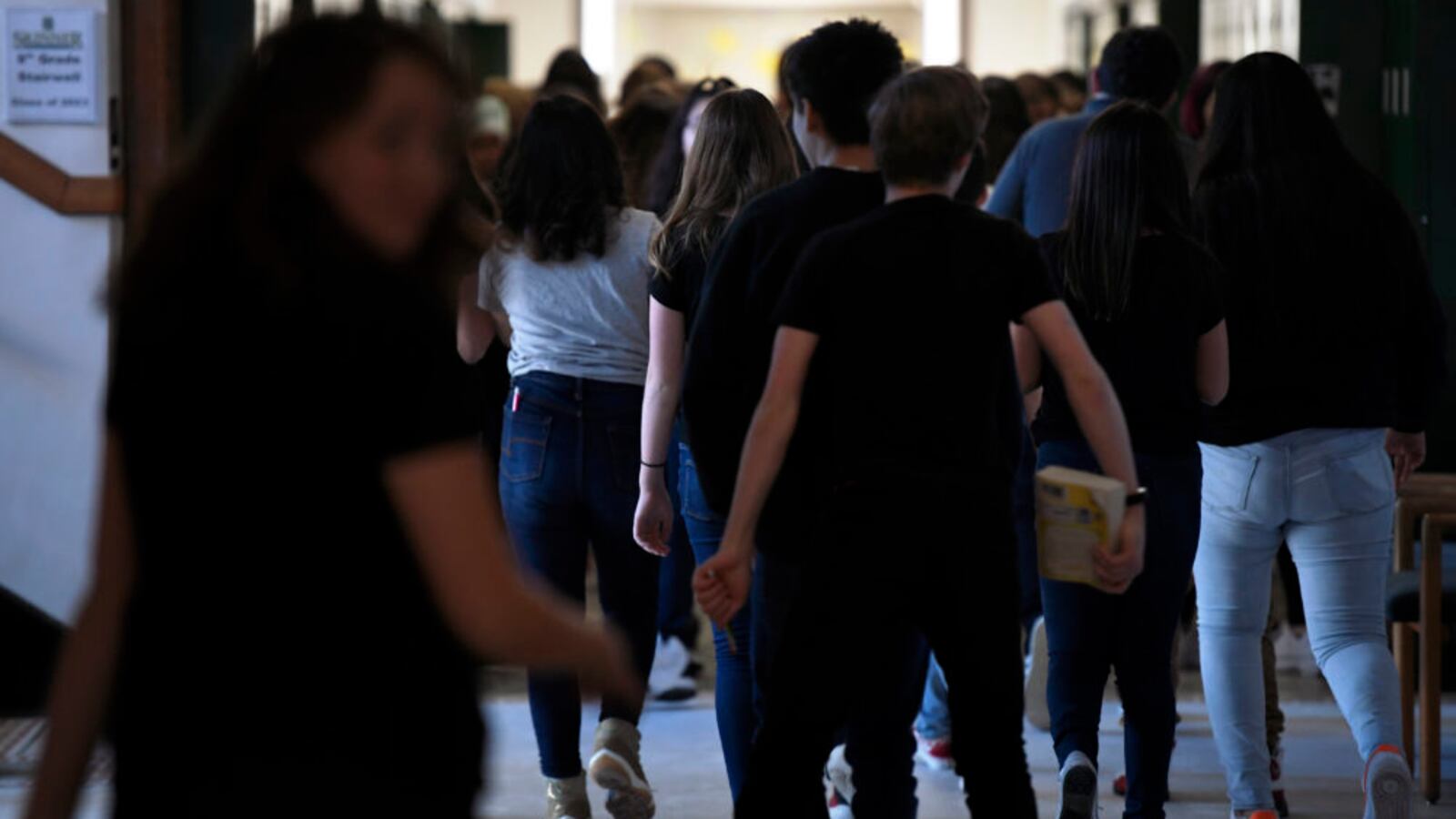Denver school district and teachers union leaders ended a long day of bargaining late Tuesday night without a deal but with a rare display of shared optimism.
The Denver Classroom Teachers Association began a strike Monday, its first in 25 years, over disagreements with Denver Public Schools about how much teachers are paid and how much bonuses for incentivizing where teachers teach should matter.
Talks between the union and district began at 10 a.m. at the Denver Public Library’s central branch and concluded about 11 p.m.
Catch up on the history of the pay system, ProComp, here and the current sticking points here. And if you missed our full complement of stories Tuesday, you can learn about immigrant teacher sitting out the strike out of fear, jockeying to sway public opinion over the issues at stake in the district, membership gains in Denver’ teachers union, and a call to better fund schools.
Our reporters were all over Tuesday’s other developments, too. Below, you can catch up on everything you need to know — including a Twitter trending topic we never thought we’d see.
Phew.
We’ll do it all again Wednesday.
12:13 a.m. A show of unity
This joint statement from Denver schools superintendent Susana Cordova and union president Henry Roman just landed in the inboxes of Denver Public Schools parents and community members:
“Today, Denver Public Schools and the Denver Classroom Teachers Association worked in good faith to find common ground on ProComp. We exchanged proposals that are moving us closer and are hopeful that we will get to an agreement soon. However, we need a little more time to resolve the outstanding issues,” and will resume negotiations at 10 a.m. Wednesday.
This is the first statement of its kind as the union and district have spent a lot of time sparring in weeks of contentious negotiations. Clearly, the sides are closing in on a deal, and there’s a good likelihood this ends Wednesday.
Our ace Denver Public Schools reporter Melanie Asmar makes sense of a marathon bargaining day in this story.
11:10 p.m. Calling it a night
And that’s a wrap.
Thirteen hours of negotiations, much of it deep in the weeds of what kind of additional education and training teachers should be able to use to get raises, ended on a cautiously optimistic note late Tuesday.
Superintendent Susana Cordova — as she has before — said she thought the two sides made progress.
The district and the union return to the bargaining table at 10 a.m. Wednesday, with the district planning to present a counterproposal as soon as possible.
Teachers, meanwhile, will be back on the picket lines.
8:26 p.m. Planning underway for Day 3
As the strike’s long second day winds to a close, teachers and their supporters are planning for Wednesday. (It’s predicted to be partly sunny and nearly 60 degrees — great weather for a winter picket.) A post on the Fair Pay For Denver Teachers Facebook group is connecting supporters with schools to “adopt” by sending coffee and other strike essentials.
“We got hand warmers, water, donuts (a lot), granola bars, and fruit today,” wrote one teacher. “And it made me march farther and chant louder.”
How long the strike will last is an open question. Most major teacher strikes in the last two years have lasted between five and nine school days, although there are ways that Denver is in a different position. And some teachers who joined pickets on Monday have already returned to the classroom or will soon.
Some teachers say they are committed to staying on strike if the union and district are not able to reach an agreement quickly.
“We’d rather come in sick than write sub plans, we wait all day to pee, we can wait out the most obstinate/challenging students,” one teacher wrote on the Fair Pay page. “We got this!”
But others are less confident. “I will be honest a number of us aren’t sure if we can sustain this for an extended time,” another teacher wrote. “I am one person with one income, no roommates, no other [income] sources.”
Other teachers voiced a similar sentiment today. We spoke with Emily Hetzler, a first-grade teacher at Dora Moore Elementary, just as picketing wound down Tuesday morning outside the stately brick edifice that is Denver’s oldest school building.
“A lot of people are saying, ‘I don’t know if I can keep going after today. I can’t afford to be missing work after today,” Hetzler said. “So I think there’s this mix of feeling very optimistic and excited (that a deal might be reached soon), and still seeing the support of all the teachers in the district who are out here fighting for what they know is right. But it’s also setting in: We’re not getting paid. We’re away from our students, and how much longer can we keep doing this?”
Three of the 19 teachers who were out on strike Monday returned to Dora Moore on Tuesday, and at least two more are expected to return Wednesday, Principal Karen Barker said. Four teachers never left their classrooms this week.
8:12 p.m. A war of words
Our bureau chief Erica Meltzer just published a new story documenting efforts by people on both sides of the pay dispute to win over public opinion. “A teacher strike is more than a labor dispute between employees and management,” she writes. “It’s a morality play — with audience participation.” Read the entire story here.
8 p.m. A late night at the library
Here’s one way that the strike is changing Denver: The central library is supposed to be closing right now — that’s why negotiations between the district and teachers union happening there were scheduled to end for the day at 8 p.m. But talks are still moving forward, so the library will stay open later than usual.
6:30 p.m. A “PDU” roller coaster in negotiations
After a calm morning and some actual jokes in the middle of the day, negotiations took a tense turn late this afternoon. The union and district are still sparring over how teachers can earn raises. Here’s a summary of the last couple of hours from Melanie, who’s been along for the ride all day:
The district came back with a new proposal. The most major change? Another “lane” on the salary schedule, which would give teachers another opportunity for a raise. That brings the total number of lanes on the district’s proposed schedule to seven. The union’s proposal has eight. But the proposal did not get a warm reception from the union. One big reason: it still included language that would require teachers to do 45 hours of study outside the regular work day to complete a training course known as a “professional development unit.” The union wants teachers to be able to put in that time during the regular work day. The requirements for these training courses are important because, under both sides’ proposals, completing a certain number would allow teachers to move a lane and get a raise. “Why are you requiring more work from our teachers?” lead negotiator Rob Gould asked. Cordova admitted that the district had spent the bulk of its hour-and-a-half caucus focused on other parts of its proposal, such as the additional lane, and had paid less attention to the 45-hour requirement for the training courses. The tone of the negotiations became more tense. “We’re professionals,” said Greg Ahrnsbrak, a physical education teacher at Bruce Randolph School and a member of the union bargaining team. “And it just feels like there’s absolutely no trust here that we’re going to behave like professionals.” The union went into caucus to consider the district’s proposal.
6:02 p.m. A trending topic
This has got to be a first. “ProComp” is trending on Twitter, at least for some users based in Colorado. (As with much on the internet, Twitter uses an algorithm to serve up content designed to target users’ interests.) “This is deeply, deeply weird,” Denver teacher Eliza Eaton-Stern tweeted.
5:50 p.m. “Not haveing the teachers was dreadful”

It’s been such a busy day that it’s taken until now to add this photo that a Denver parent shared from her first-grader’s class at University Park Elementary School today.
Angela Rathbun, who volunteered to assist the substitute assigned to the class while the regular teacher is on strike, said she took pictures after noticing that students were addressing the strike on the vocabulary worksheets the district provided.
“I felt it was important to take these photos to document how the kids are feeling about the strike,” Rathbun told Chalkbeat, “and to show their teachers that they are appreciated and missed.”
4:15 p.m. A union counterproposal
More details on the union counterproposal that came after a three-hour break in negotiations. From Melanie:
The union has offered several changes. Among them: allowing educators to complete the training courses known as “professional development units,” which allow them to get raises, during their regular work day, as opposed to requiring them to do that training outside of the work day. The district had some technical questions and then requested a break to look over the counterproposal. Of note: The tenor of negotiations is more collaborative today than it has been in recent sessions. There is less tension and frustration at the table.
Still no discussions about bonuses and incentives for teachers at high-poverty schools that had appeared to be the meatiest sticking points going into the strike.
3:52 p.m. A second lawsuit looms
On Monday, advocates for students with disabilities filed suit against the Denver district, charging that those students would be harmed by a strike. Now, a conservative organization is threatening a second legal challenge. From Melanie:
A conservative education advocacy organization has hired a lawyer and is prepared to file a lawsuit if the district and teachers union reach a deal that “violates Denver voters’ intent” when they passed a tax increase to fund the performance pay system known as ProComp, according to a press release sent by the group, Ready Colorado, on Tuesday afternoon. Ready Colorado president Luke Ragland said in a statement that “it is clear the union is trying to undermine the goals and voter intent of ProComp.” “The teachers union is trying to overturn the will of the voters, demanding the redistribution of funds approved to support high-poverty schools away from the neediest students,” Ragland said. “That is not what Denver voters signed off on.” It’s worth noting that both the union and the district have attorneys who have reviewed their proposals. Leaders on both sides have said what they’re proposing meets the spirit of the ProComp ballot language.
We weren’t around in 2005 for that ballot initiative, so here’s some coverage from the time if you want to gauge voters’ intent for yourself.
3:02 p.m. Susana Cordova’s no good, very bad job transition
It’s hard to believe, but Denver’s schools chief has been on the job only for six weeks. The school board named Susana Cordova, formerly deputy superintendent, as the sole finalist to replace longtime superintendent Tom Boasberg in December.
The strike is Cordova’s first big test, and some union members and allies say she’s falling short. Yesenia Robles has more:
When Cordova was named superintendent, she touted her experience as a teacher in the district and wanted to let everyone know she would be different from her predecessor, whose relationship with teachers was fraught. But dealing with a strike on her sixth week on the job seems to be putting an early strain on her relationship with teachers. Several signs on the picket lines across the city reference her specifically, and teachers say they are finding it hard to trust her. They have questioned her description of her offers in negotiations, for example, as well as how she characterized conditions inside schools during the strike. Now, one post titled “REOPEN THE SUPERINTENDENT SEARCH!!!!” on a public Facebook group Tuesday is asking whether the strike could cost Cordova the job. Part of the question revolves around the fact that the district hasn’t signed a contract with her yet. One was on the school board’s agenda just as teachers were voting to go on strike. The board, which supported her appointment unanimously, is unlikely to revisit its decision to hire Cordova. Still, the public discussion could make her path to win support from teachers steeper than she anticipated.
2:52 p.m. Talks resume, finally
The 30-minute break turned into a more-than-three-hour hiatus but union and district officials are now back at the bargaining table. They appear to be in good spirits. Rob Gould, the union’s top negotiator, said he thought the union had put together a strong counterproposal after this morning’s talks. And he answered a cutting question from his members with what sounds like a joke:
2:03 p.m. The case of the paused negotiations, solved
Talks between the Denver district and its teachers union broke for lunch more than two hours ago. Why haven’t they resumed? Melanie just tweeted an answer:
1:45 p.m. The scene from inside Abraham Lincoln High School
Video shot by students inside Denver high schools on Monday appeared to show chaotic conditions — a narrative that national far-right media outlets immediately amplified in an effort to discredit the teachers union.
Here’s a video from today that shows an orderly display of solidarity.
Julia Aguirre, the Abraham Lincoln High School senior who shared it with Chalkbeat, wrote this about the demonstration and what happened next:
Today we conducted a sit in school wide to visually demonstrate we have always stood with our teachers and we always will. We then marched up to the second floor chanting: “Education is our right, this is why we have to fight!” We marched in hopes of getting more students to join and they did. After we joined our teachers in the front of our school we came back to class so show we really do just want a better education. Not only do we want our teachers back, but we need them.
1:25 p.m. A poetry interlude
While we wait for negotiations to resume (Melanie reports that pizza has replaced burrito as the background fragrance), we want to direct you to a poem that a Denver teacher, Joseph Bolz, posted to Facebook this morning. In the poem, Bolz outlines the many reasons he cried on the strike’s first day: because of the cold weather, because he missed his students and classroom, because he knew some teachers who wanted to picket could not. “I cried because of the sheer beauty of it all,” Bolz wrote. “To see so many hearts with a single goal.”
12:50 p.m. Teacher strikes go to Washington
Jahana Hayes, the 2016 national Teacher of the Year who was elected in November to Congress, brought up teacher strikes on the floor of the U.S. House of Representatives today. She didn’t mention Denver specifically but did underscore a point that many Denver teachers have been making this week.
“If they think teachers are striking for salaries alone, then they don’t get it,” Hayes said. “That’s not how this works.”
At least two Democratic presidential candidates, Bernie Sanders and Elizabeth Warren, have explicitly endorsed Denver teachers.
12:15 p.m. Technical tweaks dominate morning negotiations
Here’s another dispatch from Melanie. Her last line will make you hungry:
This morning’s negotiations have been pretty technical. The district presented a new proposal for how teachers can change “lanes” on the salary schedule and get raises. The union has long advocated for allowing teachers to use training courses, called “professional development units,” to get raises, similar to how they would use college credits or advanced degrees. Last week, the district presented a proposal that would allow that. On Tuesday morning, district officials offered tweaks in response to union pushback. Union negotiators peppered district officials with questions about the tweaks, then took a break to meet privately to discuss them. Teachers in the audience used the break to stretch their legs, eat lunch, and run out to grab coffee. The row we’re sitting in smells like Chipotle burritos.
Nothing yet about the bonuses and incentives for teachers at high-poverty schools that make up many of the sticking points between the union and district.
12:09 p.m. Freebies for Denver teachers
Denver teachers on strike are benefitting from more than community goodwill right now. Local businesses are also showing their support by offering freebies for local educators. Fitness studios, coffee and pizza shops, wedding planners, and, yes, craft breweries have all volunteered their products and services. Here’s a Facebook thread tracking the offers.
11:05 a.m. The view from social media
Teachers and their allies across Denver have flooded Twitter, Instagram, and Snapchat with pictures from their pickets. We can’t possibly share them all, so here’s one that Erica Schenck, a teacher, shared of her school’s all-female science department on Instagram this morning.
10:46 a.m. National union leaders are back on the picket line
Representatives from the National Education Association, the national teachers union of which the Denver union is a chapter, are in town to picket with local teachers. Here’s what NEA President Lily Eskelsen Garcia tweeted this morning:
Our Erica Meltzer spoke Monday with Eskelsen Garcia, who said ProComp has caused “chaos” in Denver. “There is not one school district in the country that is going to look at Denver and think, ‘Oh, I think I’ll try that,’” she said.
The Denver Classroom Teachers Association helped design the ProComp pay system without the support of the national union that Eskelen García now heads.
10:25 a.m. Why you can watch Denver’s teachers contract talks
From Melanie:
In Colorado, teacher contract negotiations happen in public, which is different than in most states, where bargaining is a closed-door affair. It’s been that way since 2015, after Colorado voters passed a ballot initiative requiring the open-door sessions. That’s played out in Denver in a very high-profile way. For the past couple of years, Denver teachers have been packing bargaining sessions, first for the master contract and now for the ProComp agreement. And they don’t just watch passively. Teachers boo if they hear something they don’t like, snap if they hear something they do, and regularly shout out their opinions. When the union bargaining team entered the room Tuesday, the crowd went wild, giving them a standing ovation and starting a now-familiar cheer: “If they won’t pay us, shut it down!”
The dynamic is a boon for union members and their allies, who have more visibility now than under the old way of negotiating. That’s not what the right-wing Independence Institute anticipated when it advanced the open-meetings ballot initiative. “Transparency is good for everyone,” Jon Caldara, the institute’s president, told Chalkbeat in 2014. “If this is such an advantage for the unions, why are they against it?”
10:22 a.m. Aw, shucks!
Our reporters have been working relentlessly for weeks, and especially over the last few days, to cover this locally disruptive, nationally significant, potentially life-changing teacher strike, so it’s nice to know that our efforts are paying off with readers. Here’s one who not only acknowledged and shared our reporting but also, recognizing that local news comes with a cost, contributed to support it. Thank you, Andrew! And if you’re so inclined, here’s how you, too, can donate to Chalkbeat.
10:05 a.m. What you need to know as negotiations resume
Some essential background from Melanie Asmar:
The district and union are negotiating how to revamp ProComp, the district’s complex teacher pay system of bonuses and incentives. on top of their base salaries. The district’s last offer, made on Saturday afternoon, would add $23 million to teacher pay next year and $55 million over three years. The money would come from cutting 150 central-office positions, eliminating bonuses for top administrators, and anticipated state aid increases, according to schools chief Susana Cordova. That gets closer to but not does reach the union’s demand: $28 million more next year. The two sides also disagree on how to divvy up the money. The union wants to shrink the size of bonuses and incentives and pump more money into teachers’ base salaries, arguing that stable pay would do more to keep teachers than bonuses that can come and go. The district sees the bonuses as key to attracting and retaining teachers at high-poverty schools. The district’s Saturday offer included something the union found particularly objectionable: increasing the size of bonuses for teachers at 30 “highest-priority schools” to $3,000, from its previous proposal of $2,500. The union wants to eliminate that particular bonus altogether.
We can expect to hear more about the highest-priority schools during negotiations today.
10 a.m. A big crowd and an empty table to start negotiations

The Denver Public Library’s basement auditorium is packed with strike supporters wearing red, while a bargaining table has been assembled as negotiations resume. Melanie Asmar is at the library, where unlike in school district buildings, the wi-fi is reliable and social media isn’t blocked. That means you can follow her on Twitter for updates.
9:05 a.m.: New attention for “innovation schools”

One side effect of the strike is that teachers and parents across Denver are paying attention to “innovation schools,” dozens of schools that the district runs but frees from many rules. They’re often described (including by us!) as having “charter-like flexibility” — but unlike charter schools, their teachers are members of the local union. That came as a surprise to at least one strike ally who posted in an active Facebook group — but was quickly rebuffed by people who said their innovation schools were on the picket line today.
8:44 a.m.: Strike fund swells
As national attention has turned to the strike, the GoFundMe launched to build a strike fund — a fund that can support union members who go without pay during the day — has swelled. On Monday morning, the fund had about $26,000. Today, that number is up to $33,000. The donors include at least one craft brewery.
8 a.m.: A big question today
One thing we’re watching: Exactly how many teachers are joining the strike. The district reported Monday that 56 percent of teachers did not come to work; on Tuesday, it upgraded that estimate to 58 percent, without sharing why the numbers changed. It also said that a majority of teachers did not participate at 30 “highest-priority” schools where the union’s plan would eliminate special bonuses. Will those numbers hold up on the strike’s second day? If not, the union could potentially face a situation where less than half of members are participating — a potentially critical blow to maintaining public support.
7 a.m.: 76 percent of students in school Monday
The Denver district just released attendance data from Monday, when it said 76 percent of students showed up to school. That rate wasn’t unexpected, since the district and union both initially encouraged families to send their children to school, but it doesn’t capture the significant numbers of students who left early. Some parents posted on social media that they would not be sending their children back to school today.

